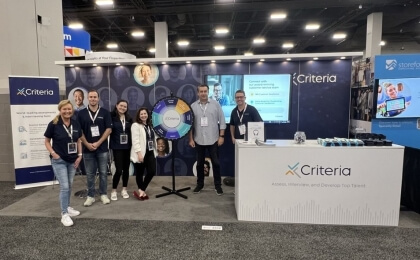There has always been a lot of fear and hesitation around data and artificial intelligence, especially when it comes to incorporating it into the hiring process. The resistance is reasonable. After all, HR is a “human” field, and hiring is such a nuanced, personal process.
“Data” can seem like a huge, seemingly unknowable concept, so it’s understandably difficult to know where to start when using it to make hiring decisions. But use it you should: a ton of research has shown that data can help predict job success and lead to dramatic business results, like lower turnover, higher productivity, and increased revenue. Using data when you hire can be your competitive advantage; not using data could do you a disservice.
In this post, we aim to alleviate some fears about data and provide simple, tangible ways to start incorporating data into your hiring process – without sacrificing that human element.
Fear of Data is Grounded in Misinformation
Why are so many of us wary of using data for hiring? You might think that data will:
- threaten the jobs and expertise of HR professionals or hiring managers
- miss the “essence” of a person, since data can’t quite understand the human element
- hijack the hiring process by basing decisions purely off numbers and figures without regard to chemistry and personality
While these concerns all make sense, in practice these don’t hold up when data and AI are used appropriately. No HR department should use data to completely replace its skilled expertise to screen and hire candidates. Data is a tool that strengthens human decisions by providing us with information we wouldn’t be able to get on our own.
Data Simply Unlocks More Information
Employers should use data and AI to build a more robust, informative profile of all of their candidates. Interviews should still be conducted, and chemistry and fit should still be considered. But “gut feelings” about a candidate should be balanced with more objective information.
Doctors who have hunches about diagnoses still order diagnostic testing to confirm their predictions. Why not dig deeper and confirm yours?
Data provides tangible information that helps employers make more informed decisions. Pre-employment tests, for example, are one of the most predictive hiring factors because the data they provide is based on decades of research on the skills and abilities associated with job performance. Leveraging this data provides insight into your potential employees that simply cannot be gleaned from resumes or interviews alone.
Data Empowers Hiring Managers
Studies have proven that data (and particularly pre-employment tests) can more accurately assess future on-the-job performance than humans can. Don’t be threatened by this information; be empowered by it! Incorporate data-driven metrics into your already solid hiring processes to make even smarter decisions.
The big reason why pre-employment tests are so telling? They’re objective and standardized. That means they compare diverse candidates using the exact same criteria, something no human can achieve.
These tests are designed to fairly and accurately predict tangible improvements in a company’s productivity, turnover, or sales revenue. What employer wouldn’t want to see this happen under their watch? If you’ve been looking for ways to improve your hiring success rates, consider incorporating more data to give you that boost.




